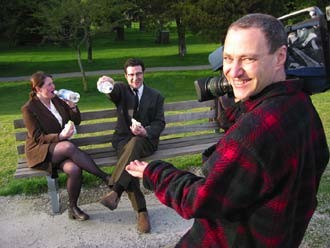|
'The Corporation' prosecutes the institution that puts acquisition above all else Conservative businesspeople who think of themselves as sophisticated in the ways of money often like to deride the smelly, unshaven young people who protest global financial organizations and polluting chemical firms, suggesting that they simply don't understand the complex issues involved. For many waving signs and chanting, that's probably true; it doesn't take much to get a 24 year-old riled up, especially when the target is filthy rich. The Corporation should be required viewing for tie-dyed protester and pin-striped broker alike: Armed with a wealth of historical knowledge and a long roster of thoughtful interviewees, the film gives voice to citizens of the world with legitimate, well thought-through complaints against capitalism as we know it. The film is dense with information and opinion; it runs a bit longer than many features, but it's smartly structured in a way that evolves so viewers don't feel they've been watching the same thing over and over again: Progressing from history to dissection, from a cornucopia of speakers to more focused, single-topic sections, it is compelling throughout. Midway through the film, Noam Chomsky makes a point that gets lost in the us-against-them ritual of protest and defense. As with slavery, the corporation is an institution, and there is a difference between the institution and the individuals participating in it - there were relatively benevolent slave owners, just as there are heads of petrochemical giants who truly want to do the right thing for the environment. The problem is the framework in which those people operate.
Trouble is, when a corporate person knowingly gives thousands of people cancer, or steals millions from the IRS, or dumps untold numbers of gallons of oil on a beach, that person has no body to put in jail, and the idea of unrestrained corporate activity has taken such hold that the idea of putting that corporate person to death is wildly unorthodox. This movie makes a good case for that idea, though, and another strong argument regarding the nature of corporations: If the firm is a person, its actions can be evaluated in the terms we use for human beings. Using the diagnostic tools of psychology, the corporation - which has no concern for others' welfare, lies as a matter of course, and strives to take no responsibility for its actions - is a psychopath. Greed is its sole reason for living, and even the guy in the pin-stripe suit (like some of the executives interviewed here) would have to admit that, sophisticated rationalizations aside, that's the truth. • By John DeFore
|
Tags:

KEEP SA CURRENT!
Since 1986, the SA Current has served as the free, independent voice of San Antonio, and we want to keep it that way.
Becoming an SA Current Supporter for as little as $5 a month allows us to continue offering readers access to our coverage of local news, food, nightlife, events, and culture with no paywalls.
Scroll to read more Movie Reviews & News articles
Newsletters
Join SA Current Newsletters
Subscribe now to get the latest news delivered right to your inbox.
















